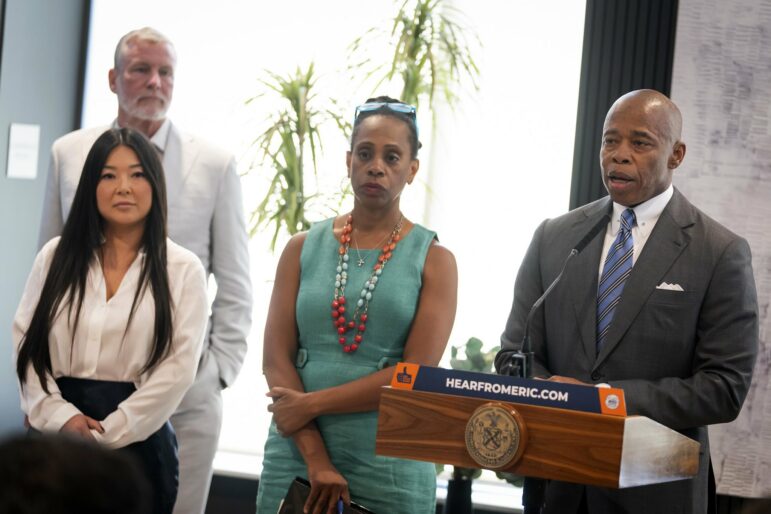More than 500 new households can access city-funded rental vouchers after the elimination last month of the so-called “90-day rule” for applicants, Mayor Adams said Tuesday. The update came weeks after he vetoed a package of legislation, passed by the City Council in May, which would have expanded CityFHEPS eligibility to even more households.

Ed Reed/Mayoral Photography Office.
Mayor Adams and DSS Commissioner Molly Wasow Park at Tuesday’s press conference.With reporting by Emma Whitford and Julia Goldberg.
More than 500 new households can access city-funded rental vouchers following Mayor Eric Adams’ elimination last month of the so-called “90-day rule” for applicants—though his administration has blocked wider reforms sought by lawmakers to make even more New Yorkers eligible for the subsidies, saying such an expansion would be “problematic.”
At a press conference in Brooklyn on Tuesday, Adams offered an update on his June emergency rule, which tweaked criteria for the City Family Homelessness and Eviction Prevention Supplement (CityFHEPS) voucher program, including lifting a requirement that applicants spend months in the shelter system before they’re eligible.
Advocates had long pushed the city to overturn the 90-day rule, saying it made the already difficult process of finding an affordable apartment take even longer as the city’s homeless population climbs and the shelter system struggles for space amid an asylum seeker crisis.
“This is something previous administrations were asked to do, but we got it done. We removed that,” Adams told reporters, adding that the city also saw a 17 percent uptick in the number of New Yorkers who moved from shelters into permanent housing in fiscal year 2023, which ended June 30.
But the mayor’s announcement comes just weeks after he vetoed a package of legislation, passed by the City Council in May, which would have expanded CityFHEPS eligibility to even more households by raising income eligibility, eliminating work requirements and letting people apply before they become homeless, in addition to axing the 90-day rule.
Councilmembers immediately said they would override the mayor’s veto, a move that’s expected to take place at the Council’s stated meeting on Thursday.
“The Council passed the most significant policy reforms to address homelessness within our city in years by improving access to CityFHEPS that can also proactively avoid evictions,” Council Spokesperson Rendy Desamours said in a statement Tuesday, saying the mayor’s stance for opposing the legislation “makes no sense.”
Adams has argued that expanding eligibility will make it harder for existing voucher holders to land an apartment, an already onerous process in a city where source of income discrimination against renters is common, and where demand for affordable apartments greatly outstrips supply.
“The legislation was going to take those who lived in shelter and have them compete for the limited supply of housing with those who may have fallen behind in their rent,” the mayor said Tuesday, referencing one bill in the package he vetoed, sponsored by Councilmember Pierina Sanchez, that would have made any income-qualifying household at risk of eviction eligible for CityFHEPS.
“The inventory is just not there,” Adams said, reiterating calls for the state to pass regulations to allow for greater affordable housing production.
But lawmakers have stressed the need to help more tenants remain in their homes before they enter shelter, as the system struggles to meet capacity. An estimated 54,000 asylum seekers from the southern border remain in the city’s care, joining a homeless population that was already rising before their arrival.
In recent weeks, the city has set up shelters in churches and other alternative sites, and bussed migrants to hotels upstate in an effort to free up shelter space.
“Every New Yorker kept in a current apartment subtracts from those entering the shelter system and searching for new apartments with vouchers,” Desamours, the Council spokesman, said in a statement. “It is the mayor’s approach of forcing more people into shelters in order to be eligible for vouchers that will create more competition in a limited housing supply.”
Estimates of how much the expanded voucher program will cost vary. City Hall has estimated that the City Council’s reform package would add 47,000 new voucher households each year, and cost about $17.2 billion over five years. The City Council started with the same assumption of new cases, but projected a cost of $10.6 billion over five years, factoring in $2.1 billion in anticipated shelter savings.
In a June analysis, the Community Service Society of New York (a City Limits funder) predicted a much lower net cost of $3 billion over five years, factoring in estimated shelter savings as well as the the cost differential between the apartments low-income tenants are fighting to hold onto and more expensive apartments on the open market.
The City Council is expected to override the mayor’s veto of the bills at its meeting on Thursday. Adams suggested another fight may be in store after that, saying the state and the city’s Department of Social Services (DSS) “are in charge of making the determination” around CityFHEPs rules.
“The state determines the subsidies, rules. DSS actually applies them,” Adams said when asked about the veto Tuesday.
“I think that we have to wait to see what they’re going to do,” he said, of the Council. “I can’t speak on their behalf. We take action after.”
This story has been updated since original publication to include additional details.








